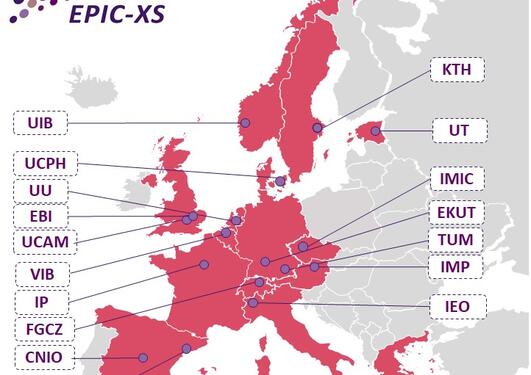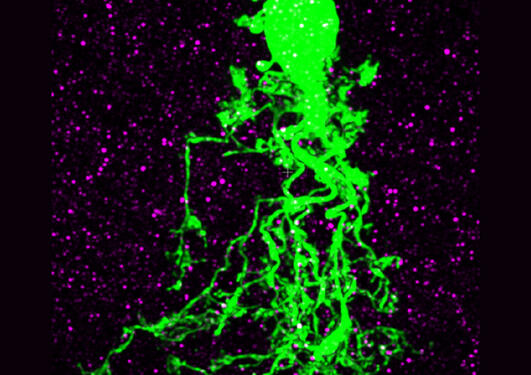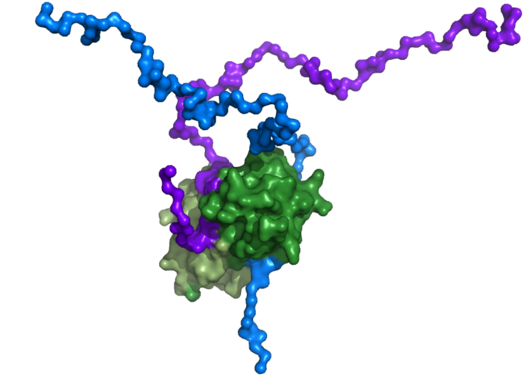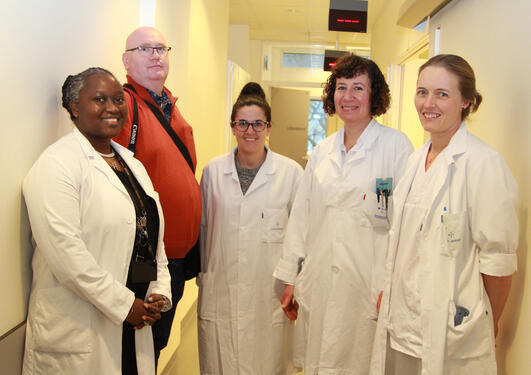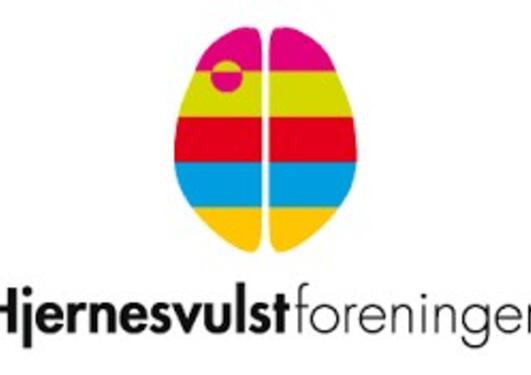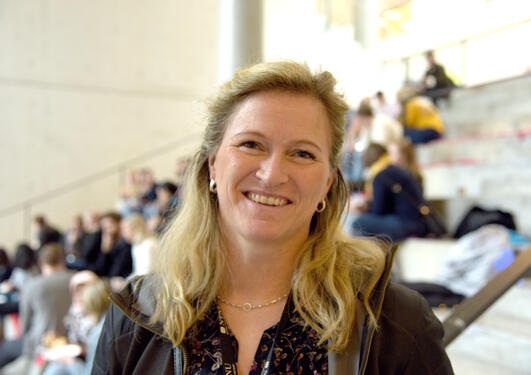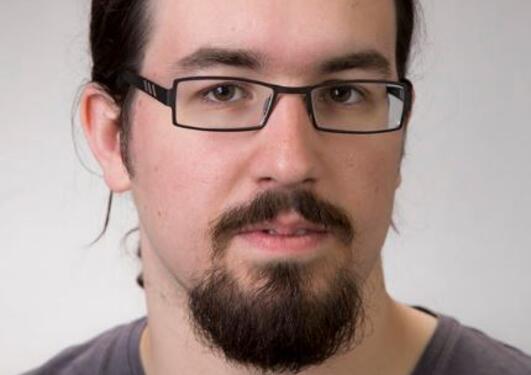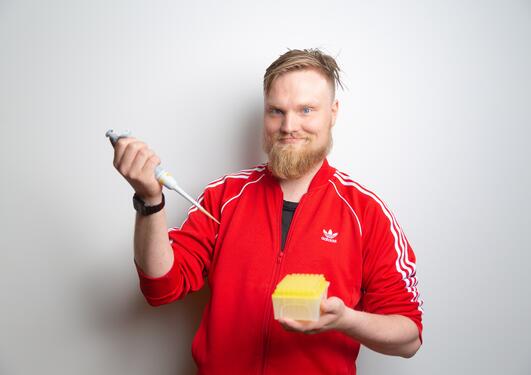News archive for The Department of Biomedicine
Thomas Arnesen and Harald Barsnes from the Department of Biomedicine are part of a new european consortium in the field of mass spectrometry based proteomics research. The European Union has awarded 10 million Euro.
Cinderella is a tale of being lifted from obscurity to recognition and significance. A review by young researchers at the Department of Biomedicine highlights the importance of the post-translational modifications of actin.
The Retinal Microcircuits Research Group investigates how neurons in the retina communicate to produce vision. In their latest study, they looked outside the conventional neural circuits and found some unexpected receptor molecules in unexpected locations.

Suicide gene therapy of glioblastoma induces an immunosuppressive microenvironment.
One long-standing question in myelin biochemistry was solved, as a new binding partner specific for the large isoform of MAG was identified.
Matrix Biology group leader and CCBIO PI Donald Gullberg recently returned from an inspiring conference in China.
The research laboratory for brain cancer immunology and therapy at the Department of Biomedicine has received the secretary general of the Brain-Tumour Society Rolf Ledal to discuss current and future research projects.
This phase IB/II trial is designed to investigate the safety and survival benefits for patients with recurrent glioblastoma with unmethylated MGMT promoter treated with Bortezomib and Temozolomide in a specific schedule.
For the third time, the Faculty of Medicine organized a career day for its PhD candidates. NTNU sent representatives to learn from us.
In an article published in Aftenposten Viten, researcher Marte Innselset Flydal describes how she is planning to develop medicine for children suffering from the rare disease phenylketonuria.
Meg Veruki and Espen Hartveit from the Retinal Microcircuits Research Group at the Department of Biomedicine have been chosen to be the Visionaries of the Quarter for the European Vision Institute.
Researcher's Grand Prix-cadidate Illimar Hugo Rekand is working to keep us healthy. He is investigating new opportunities for making new medicines in a world where antibiotic resistance is an increasing challenge.
The role of integrin a11 in breast cancer
Pages
- January 2025 (3)
- December 2024 (1)
- November 2024 (1)
- September 2024 (1)
- August 2024 (2)
- June 2024 (3)
- May 2024 (1)
- April 2024 (1)
- March 2024 (1)
- February 2024 (3)
- January 2024 (1)
- October 2023 (2)
- September 2023 (2)
- August 2023 (2)
- July 2023 (2)
- March 2023 (4)
- February 2023 (1)
- January 2023 (1)
- December 2022 (4)
- November 2022 (1)
- October 2022 (4)
- September 2022 (3)
- June 2022 (2)
- May 2022 (4)
- April 2022 (3)
- March 2022 (8)
- January 2022 (2)
- December 2021 (1)
- November 2021 (3)
- October 2021 (1)
- September 2021 (3)
- August 2021 (4)
- July 2021 (1)
- June 2021 (2)
- May 2021 (1)
- April 2021 (2)
- March 2021 (2)
- February 2021 (4)
- January 2021 (1)
- December 2020 (4)
- November 2020 (4)
- October 2020 (2)
- September 2020 (5)
- June 2020 (1)
- May 2020 (2)
- April 2020 (3)
- March 2020 (2)
- February 2020 (4)
- January 2020 (1)
- December 2019 (3)
- November 2019 (6)
- October 2019 (2)
- September 2019 (4)
- August 2019 (2)
- June 2019 (4)
- May 2019 (4)
- April 2019 (1)
- March 2019 (7)
- February 2019 (8)
- January 2019 (7)
- December 2018 (3)
- November 2018 (5)
- October 2018 (4)
- September 2018 (5)
- August 2018 (4)
- July 2018 (2)
- June 2018 (2)
- April 2018 (2)
- March 2018 (4)
- February 2018 (3)
- January 2018 (2)
- November 2017 (4)
- October 2017 (5)
- September 2017 (3)
- August 2017 (3)
- June 2017 (2)
- April 2017 (2)
- March 2017 (1)
- January 2017 (7)
- December 2016 (1)
- November 2016 (2)
- October 2016 (4)
- September 2016 (1)
- August 2016 (2)
- July 2016 (3)
- June 2016 (2)
- May 2016 (2)
- April 2016 (1)
- March 2016 (2)
- February 2016 (1)
- January 2016 (2)
- October 2015 (2)
- July 2015 (1)
- June 2015 (2)
- May 2015 (1)
- April 2015 (2)
- March 2015 (1)
- February 2015 (1)
- January 2015 (2)
- December 2014 (3)
- October 2014 (2)
- September 2014 (1)
- August 2014 (1)
- June 2014 (1)
- April 2014 (5)
- March 2014 (1)
- February 2014 (1)
- January 2014 (2)
- November 2013 (4)
- October 2013 (3)
- September 2013 (1)
- June 2013 (1)
- May 2013 (1)
- April 2013 (1)
- March 2013 (1)
- January 2013 (1)
- December 2012 (1)
- November 2012 (1)
- September 2012 (2)
- August 2012 (1)
- July 2012 (1)
- May 2012 (1)
- April 2012 (1)
- March 2012 (4)
- February 2012 (1)
- January 2012 (2)
- November 2011 (2)
- October 2011 (3)
- August 2011 (1)
- June 2011 (3)
- May 2011 (2)
- April 2011 (5)
- February 2011 (3)
- January 2011 (2)
- December 2010 (1)
- November 2010 (4)
- October 2010 (4)
- May 2010 (4)
- April 2010 (1)
- March 2010 (5)
- February 2010 (5)
- January 2010 (1)
- November 2009 (4)
- October 2009 (3)
- September 2009 (1)
- July 2009 (2)
- May 2009 (1)
- April 2009 (2)
- March 2009 (1)
- February 2009 (2)
- January 2009 (1)
